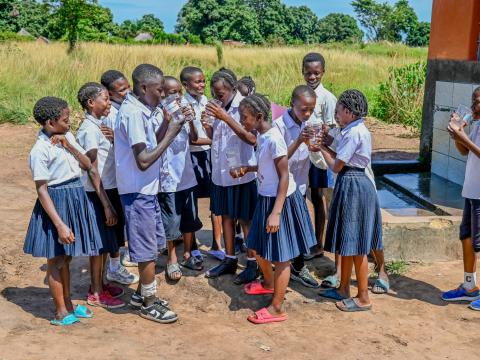DR Congo: How Clean Water and Small Cups Transformed Student Hygiene in Lualaba

By Tatiana Ballay, Communications Officer
In Mutshatsha, a rural town in Lualaba province in southern DRC, the Amani Primary School has long struggled with access to safe water. Until September 2022, students attended class without any on-site source of potable water, a reality still widespread across the region. As of 2023, an estimated three out of ten schools in the area still lacked access to clean water and basic sanitation facilities, even though water and hygiene are essential for both attendance and academic success.
That changed when a borehole was installed on the school grounds, finally providing safe, clean water for over 1,600 students and teachers. The impact was immediate: no more long walks to fetch water, students could drink throughout the day, and overall hygiene on campus improved.
“Before the borehole, we lost a lot of time looking for water. Now, everything is simpler,” says 10-year-old Célestin, a sixth-grade student at Amani Primary School, reflecting on how much the school has changed since the faucet was installed.
But one small detail still stood in the way of fully reaping the benefits of clean water: how the children were drinking it. Without cups or mugs, most students drank straight from the faucet using their hands. At every break, long lines of children leaned over the tap, cupping their hands to catch a few quick sips.
It wasn’t ideal. “The only way for a child to drink is to lean over the sink. There are no cups. It’s impractical and unhygienic,” one teacher explained.
Younger students struggled the most spilling water, having difficulty reaching the stream, and contaminating the source with dirty hands.
Célestin admits:
“I used to drink directly with my hands, and the water would get dirty quickly. Sometimes, I preferred staying thirsty rather than drinking like that.”
On average, for every liter that flowed this way, only about 100 milliliters were consume the rest spilled onto the ground.
So, while the borehole brought water, students still weren’t drinking enough, and hygiene risks remained high.
Amani Primary School wasn’t alone. Other schools in the province with access to water faced the same issue. The solution? Surprisingly simple.
In early 2025, a batch of brand-new plastic cups was delivered to four schools: Amani Primary School, Mutshatsha High School, Maendeleo Primary School, and Tshifula Primary School. Every student regardless of age received a personal cup to use during the school day. A total of 3,625 cups were distributed: 1,625 at Amani Primary School, 850 at Mutshatsha High School, and 575 each at Maendeleo and Tshifula Primary Schools.
On distribution day, students lined up class by class, smiling shyly as they received their new, colorful cups.
“We were told to always rinse the cup before drinking, and to keep it clean ourselves,” says Marie, 11, a fifth-grader at Amani Primary School, proudly showing off her blue cup.
With a personal cup, students now drink safely and comfortably. No more jostling at the faucet or balancing water in shaky hands. Instead, a neat line forms, each child waiting their turn to fill their cup and drink at their own pace. Water stays clean and is no longer wasted.
“Drinking water has become easy and we don’t get wet like before”, says Marie.
Teachers quickly noticed a difference. Students stay better hydrated throughout the day, no longer waiting until they get home to drink. As a result, many are more attentive in afternoon classes, no longer distracted by thirst.
The simple act of giving each child a cup has further improved hygiene and health at Amani Primary School.
“I’m no longer afraid of catching germs when drinking water,” says Augustin, 11, another sixth-grader.
He is relieved that he no longer needs to touch the faucet with his mouth or hands.
The other three beneficiary schools saw similar improvements. Though they had water via community boreholes or external connections, students had previously drunk “as best they could”, often the same way as those at Amani Primary School once did. With the introduction of individual cups, they can now fully benefit from the clean water available.
School directors report that teaching hygiene practices is now easier. It’s simpler to encourage handwashing and safe drinking habits when each student has a clean, personal cup.
What seemed like a small, even trivial item, a plastic cup, turned out to be the missing piece in improving school well-being.
In just a few years, these four schools in Lualaba province have undergone a quiet transformation. First came access to water. Then came the tools to use it properly.
Today, drinking at school is no longer a source of stress or illness, it’s a safe, simple, and natural part of daily life.
The children of Mutshatsha treasure their cups, aware that this small object has made a big difference. In the sunny courtyard of Amani Primary School, the faucet continues to flow. But now, water ends up in steady hands, in clean cups, and in quenched thirsts, no longer wasted on the dusty ground.
This cup distribution was part of World Vision’s Gifts-In-Kind (GIK) program, aimed at promoting safe access to potable water and better hygiene practices in schools.